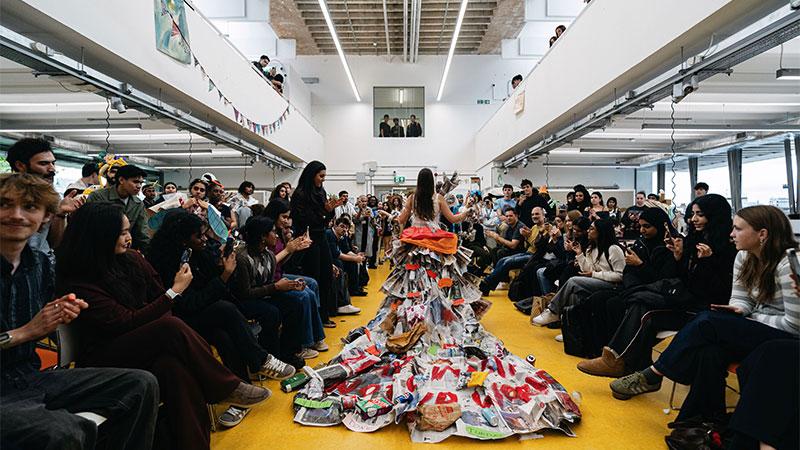The University of Westminster’s School of Architecture + Cities recently held its second Climate Action Week, bringing together more than 325 first-year students across the six architecture and built environment disciplines to explore how design can help address the global climate crisis.

Between 13-17 October during Climate Action Week, or participants attended a range of collaborative events, where they considered how the built environment might respond to significant climatic, ecological, social and political issues.
The students came from various courses within the School, including Architecture BA Honours, Interior Architecture BA Honours, Architecture and Environmental Design BA Honours, Architectural Technology BSc Honours, Urban Planning and Design BA Honours and Architecture with Foundation BA Honours.
The week opened in the Hogg Lecture Theatre with introductions from Professor Dibyesh Anand, Deputy Vice-Chancellor for Global Engagement and Employability, Kate Cheyne, Head of the School of Architecture + Cities, Ro Spankie Director of the School of Architecture + Cities Climate Action Task Force (ArCCAT) and Morgan Lirette, the University’s Sustainable Development Advisor. They spoke on the University’s commitment to the UN Sustainable Development Goals (SDGs) and its broader sustainability vision.
The keynote address was delivered by Charlie Waterhouse, Interdisciplinary Creative Strategist and Co-founder of the communication lab Absurd Intelligence, and Hard Art, a cultural collective of artists, activists and scientists standing in solidarity in the face of climate and democratic collapse. Waterhouse spoke about cultural solidarity and the role of narrative leadership in confronting today’s issues.
Students also heard from Lucy Gardener of Citizens UK, who encouraged them to take practical steps toward action through writing down what they would like to change in their own communities and practices.
On the second day, students participated in Climate Fresk, a three-hour collaborative workshop run by 26 trained facilitators. The interactive game, developed in France and played more than two million times worldwide, helps participants understand the interconnected causes and effects of climate change through collective problem-solving rather than competition.
Working in mixed groups of seven or eight, students explored how climate systems operate, deepening their understanding of both global and local environmental challenges.
The week concluded with a focus on action. Drawing on insights from earlier sessions, students reflected on how their emerging professional roles as architects, planners, designers and technologists, can contribute to meaningful change.

Building on discussions from the Climate Fresk workshop, the groups selected a specific climate issue or theme to focus on and designed either a banner or a wearable piece that expressed their chosen message. The project culminated in a catwalk event, where students proudly showcased their protest-inspired creations.
Nino Tughushi, Interior Architecture BA Honours student, said: “Climate Action Week changed our perception of climate issues. What seemed like a far future issue is right at our doorsteps. We wanted to show exactly that with fashion protest. If we can wear it, we can’t pretend it’s invisible.”
Victoria Kulathilake, Architecture and Environmental Design BA Honours student, added: “Charlie Waterhouse’s talk really challenged me to think differently about how we communicate climate issues through design and activism. It was so inspiring and encouraged us to express climate action in more creative and meaningful ways.”
The Climate Action Week, organised by Ro Spankie, Richa Mukhia and Neil Kiernan, not only educated students about the SDGs but also contributed to several goals including 13: Climate Action and 17: Partnerships for the Goals. Since 2019, the University of Westminster has used the SDGs holistically to frame strategic decisions to help students and colleagues fulfil their potential and contribute to a more sustainable, equitable and healthier society.
Find out more about Architecture, Interiors and Urban Design courses at the University of Westminster.








